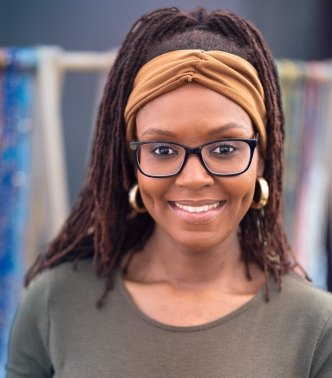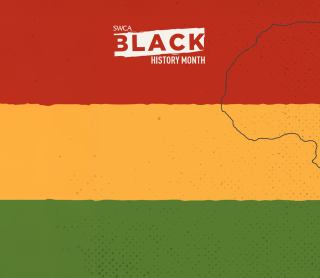Iynna Baker, a co-lead of the Black Employee Resource Group at SWCA alongside Dorrana Stewart, discusses Black history and culture, supporting her family and community, and her goals with leading the ERG.
 Iynna Baker, People Support Manager and CO-LEAD OF THE BLACK EMPLOYEE RESOURCE GROUP AT SWCA
Iynna Baker, People Support Manager and CO-LEAD OF THE BLACK EMPLOYEE RESOURCE GROUP AT SWCAQ: Hi, Iynna! Thank you for sharing your time with us today. Would you like to get started by telling us about yourself and your career?
A: I’m from San Diego, where my career started in the private security industry. I earned my bachelor’s degree in Criminal Justice with an emphasis in Security Management. When I worked as the District Support Manager for a security company, my role became focused on human resources – which I didn’t expect. Then, the company underwent a huge merger, and I was suddenly in charge of HR for over 3,500 employees. I started traveling all over San Diego to put out fires, and I was grateful for the opportunity, but I was burning out.
I moved to Phoenix in 2018. After about a year of legal work and employee relations at a printing company, I found my way to SWCA, and now I’ve been here for three years. As People Support Manager, I support HR compliance with required federal reporting such as affirmative action and veterans’ affairs, employee accommodations and ergonomics, leaves of absence, and more.
Q: What are your favorite things to do outside of work?
A: For me, it’s all about family. I’ve got a toddler and a 14-year-old, so I spend a lot of time with them outside of work. I’m on the board of The Black HR Society as the VP of Branding and Communications. We meet weekly and host events to support fellow Black HR professionals, network locally in Phoenix, and support opportunities for career development.
My family owns a business called New Age Vision. We sell a natural and organic skincare line and traditional Ghanaian waist beads. Our business is already three years strong!
Q: How did you start leading the Black ERG, and what does leading the group mean to you?
A: I started in the ERG as a member, and Dorrana Stewart had already built such a fantastic, well-established group. We have excellent meetings, with great guests and content, and I always feel enriched afterward. When the leadership opportunity came up in April 2022, it was a no-brainer for me.
Co-leading this group is important because being Black in a corporate space can be tricky to navigate. I value the opportunity to support and provide guidance, as well as receive guidance. I want to foster a space for that.
Q: What are the goals and activities of the group?
A: We are planning to talk more about Black health and financial stability. This year, we also want to focus on equity. We want to talk about what equity is and why it is important for Black people to continue to fight for it in our communities, healthcare, and the workplace.
Q: What would you like people to know about your culture and history?
A: I celebrate my culture by learning and going to museums. The United States’ education system is purposely choosing not to tell the truth about our history, so I make it a point to educate myself. I like to go out into my community and participate in Black and cultural festivals. I spend time with my elders, bonding by listening to their stories and experiences. I support Black businesses and contribute to my community as a resource, mother, sister, and friend. I bring other community members into spaces where they can thrive and feel appreciated and valued. I celebrate by trying to be the best version of my ancestors.
I would like people to know that our culture and history did not start with slavery. We were thriving, wealthy, civilized communities before slavery. We were educated and spiritual. We were mothers, fathers, warriors, educators, doctors, scientists, inventors, and more. I want people to know that we didn’t lose any of that with slavery. We still have all those skills. We are an extremely passionate, open, welcoming, and loving community. We love our kids. We raise our kids to be strong, smart, and safe. At the heart of every Black community is the family and how much we value our families. We have traditions and spirituality that we cultivate in our families.
I also want people to know about the connection that we keep with our past. We’re so connected to our ancestors. We passed down our history and culture through word of mouth – because we either couldn’t keep our traditions in practice, or we weren’t able to write them down. I want to share the fact that we have so much that we passed down, which we celebrate in our own unique ways.
Q: How can individuals better support and be allies to the Black community?
A: To be supportive, in corporate environments and outside of them, we want everyone to have the same expectations for us that they have for white counterparts. To support your Black colleagues at work, please consider your expectations. Don’t expect us to work long hours, overperform, or be happy all the time. We shouldn’t feel like we have to give more just to get a seat at the table. The expectations for everyone should be the same.
Q: What does equity mean to you and why is it important as a person of color?
Equity means a great deal to me as a Black person. It encompasses a profound sense of fairness, justice, and opportunity. Equity acknowledges that historical and systemic injustices have created disparities in access to resources, opportunities, and outcomes for Black individuals and communities.
For me, equity means striving for a world where every Black person has the same chance to succeed and thrive as anyone else, regardless of their race. It’s about recognizing and addressing the deep-rooted inequalities that have persisted for centuries. It’s about dismantling systemic racism and bias in all aspects of life, from education and employment to healthcare and criminal justice.
Equity is not just a buzzword; it’s a commitment to leveling the playing field. It means advocating for policies and practices that actively address disparities and promote inclusivity.
Ultimately, equity means that my children and future generations won’t have to face the same obstacles and prejudices that I have encountered. It’s about creating a society where Black excellence is celebrated and supported, and where we can all contribute to our fullest potential.
